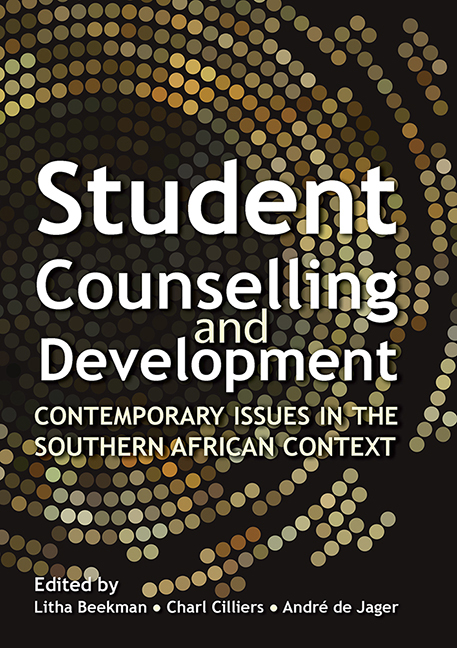Book contents
- Frontmatter
- Contents
- Figures
- Tables
- Preface
- Section 1 Development of Student Counselling and Development in Southern Africa
- Section 2 Theoretical Foundations of Student Counselling and Development in Higher Education
- Section 3 Services and Programmes Provided by Student Counselling and Development Units
- Section 4 Student Counselling and Development For Special Groups
- Section 5 Quality Assurance and Ethical and Professional Issues
- Contributors
- Index
Chapter 8 - Counselling and Psychotherapy in Higher Education in A Southern African Context
Published online by Cambridge University Press: 22 February 2020
- Frontmatter
- Contents
- Figures
- Tables
- Preface
- Section 1 Development of Student Counselling and Development in Southern Africa
- Section 2 Theoretical Foundations of Student Counselling and Development in Higher Education
- Section 3 Services and Programmes Provided by Student Counselling and Development Units
- Section 4 Student Counselling and Development For Special Groups
- Section 5 Quality Assurance and Ethical and Professional Issues
- Contributors
- Index
Summary
INTRODUCTION
The increases in societal complexity and the diverse student population at higher education (HE) institutions make it essential for counsellors and therapists to view students and their behaviors within the psychosocial context of the HE system in an ever-changing socio-economic environment. It is important to differentiate among the particular personal, interpersonal, cultural, societal, and HE system variables contributing to students’ wellness, and to understand the interrelationship of those variables. This kind of information is important in order to assess students accurately, to plan treatment, and to refer to collateral helpers in other sub-systems within the HE system. This chapter provides information to counsellors and therapists about the African tradition of psychological assistance to clients/students. The chapter is extremely important because counsellors and therapists at South African universities are still mostly trained in traditional forms of psychology and have little information, besides general chapters on multi-cultural counselling, available to inform them about the African tradition in particular. The second part of the chapter addresses challenges that face counsellors and therapists in HE institutions.
SOUTHERN AFRICAN CONTEXT
The term “Southern Africa” refers to the Southern African Development Countries (SADC) inclusive of South Africa, Botswana, Swaziland, Lesotho and Namibia. An active form of cooperation has existed between these countries for almost 30 years through the HE counsellors’ association currently referred to as the Southern African Association for Counselling and Development in Higher Education (SAACDHE), previously known as the Society for Student Counselling in Southern Africa (SSCSA). Counselling services are particularly well developed in South Africa. Hence this discussion will focus on this constituency.
Before 1994, South African society was divided racially by the laws of the apartheid regime. After 1994, since the emergence of democracy in South Africa, the country has grappled with the challenges of creating a society which respects the human dignity of all persons and celebrates their racial and cultural diversity. Distinctive cultural practices are identifiable among population groups referred to as African, coloured, Indian and white. Through its social engineering, the apartheid regime kept these groups geographically separated for at least four decades, resulting in the evolution of unique “population” identities.
- Type
- Chapter
- Information
- Student Counselling and DevelopmentContemporary issuesin the Southern African Context, pp. 147 - 170Publisher: University of South AfricaPrint publication year: 2012
- 1
- Cited by



